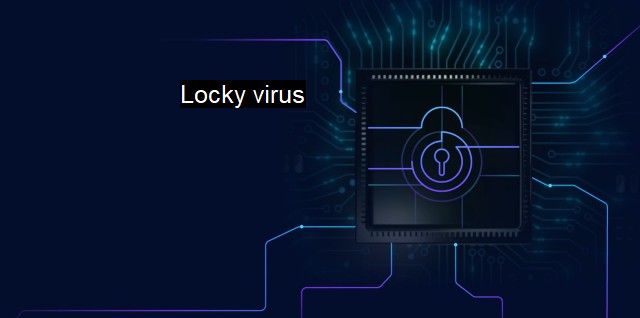What are Locky virus?
Understanding the Locky Virus: Malware That Holds Your Files Hostage and Its Advanced Techniques for Evasion and Ransom
The Locky virus is a type of malicious ransomware that infiltrates computer systems with the primary objective of extorting money from victims. This phenomenon is part of the troubling rise of cyber criminal activity, highlighting the ongoing urgency for advanced cybersecurity strategies and dependable antivirus software.The Locky virus was first discovered in the cyber realm in 2016, making headlines for its highly destructive potential. The creators of this virus focused on three main areas: distribution, encryption, and ransom. This approach enabled the virus to swiftly spread across millions of computer systems worldwide with an alarmingly high rate of success.
Understanding the transmission of the Locky virus is key to its effective prevention. Typically, the virus enters the system through deceptive emails that lure users into triggering the malware that installs the ransomware. One commonly used method is an email disguised as an invoice requiring payment. This email contains a disguised attachment, typically a Word document with Macros, programmed to download and install the malicious Locky ware onto the unsuspecting victim's computer.
The next step is encryption. After the virus is successfully installed, the Locky malware begins to encrypt valuable data, embedding a .locky extension on targeted files. The victims are usually unaware of the encryption process until it's too late and their files have become inaccessible.
With the files successfully encrypted and guarded by complex cryptographic algorithms that are impossible for the average user to crack, the Locky ransomware prepares to deliver an ultimatum. The victims are presented with a ransom note - typically a text file or an HTML page that directs the victim to a payment portal. The alphanumeric string value in the .locky file extension usually represents the ID of the infected user. The victims are asked to pay a ransom, typically in Bitcoin, in exchange for receiving a decryption key from the offenders.
Being a type of ransomware, Locky virus exploits emotional pain points to yield immediate results; it relies on the desperation of victims to access their invaluable files and data. Unfortunately, numerous individuals and organisations have succumbed to these tactfully crafted ransom notes, feeding into the perpetrators' profiteering motives.
The relentless evolution of viruses like Locky underscores the existential need for robust cybersecurity and effective antivirus solutions. Ensuring constant real-time protection and maintaining up-to-date antivirus databases to keep up with this continuously evolving digital adversary landscape is of vital importance. Also, reliable antivirus software, with the right set of features, including state-of-the-art scanning technology and preemptive behavior-based security algorithms, helps in immediate detection and prevention of such invasive threats, thereby protecting sensitive data.
Keeping software and operating systems updated is another essential practice, as updates often include patches for security vulnerabilities. Efficient backup of critical data, preferably on a separate offline medium, is also helpful to minimize data loss without succumbing to the ransom demands.
Education about ransomware distribution channels, particularly deceptive videos, email attachments, and dubious web links, may also contribute extensively to preventing these cases. A well-informed and vigilant user can mitigate risks by learning and applying safe email and web browsing practices.
The Locky virus is a harmful software program acting host to a plexus of cybersecurity issues. Its intent of extortion illustrates the darker side of the computer realm, but the relentless work of cybersecurity professionals and the increasing awareness about antivirus software propels one into a future where such threats may be neutralized even better, thus creating digitally safer spaces. Therefore, comprehensive cybersecurity is an absolute necessity where new threats emerge almost daily.

Locky virus FAQs
What is the Locky virus?
The Locky virus is a dangerous ransomware that encrypts files on infected systems and demands payment in exchange for a decryption key. It was first detected in early 2016 and has since caused significant damage to individuals and organizations around the world.How does the Locky virus spread?
The Locky virus typically spreads through phishing emails that contain malicious attachments or links. Once a user clicks on the attachment or link, the virus is downloaded onto the system and begins encrypting files.How can I protect myself from the Locky virus?
To protect yourself from the Locky virus, you should always be cautious when opening emails from unknown senders and avoid clicking on suspicious links or attachments. It's also important to keep antivirus software up to date and to regularly back up important files.What should I do if my system is infected with the Locky virus?
If your system is infected with the Locky virus, you should immediately disconnect from the internet to prevent the virus from spreading to other systems. Then, contact a cybersecurity professional for assistance with removing the virus and potentially recovering your encrypted files. It is important not to pay the ransom as there is no guarantee that you will receive a decryption key.| | A | | | B | | | C | | | D | | | E | | | F | | | G | | | H | | | I | | | J | | | K | | | L | | | M | |
| | N | | | O | | | P | | | Q | | | R | | | S | | | T | | | U | | | V | | | W | | | X | | | Y | | | Z | |
| | 1 | | | 2 | | | 3 | | | 4 | | | 7 | | | 8 | | |||||||